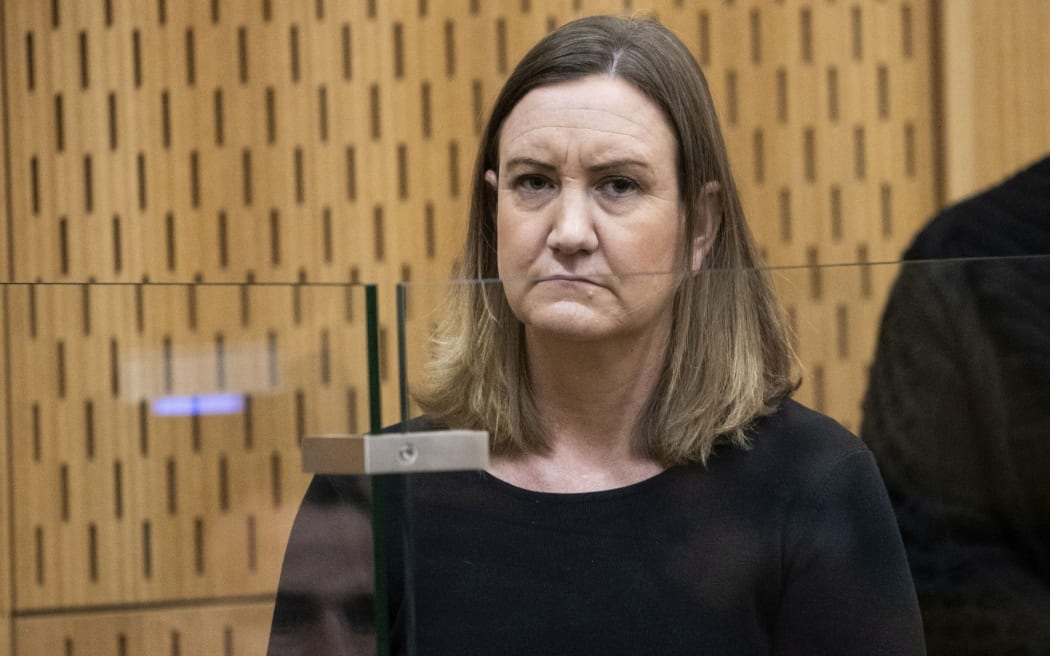
Lauren Anne Dickason in the High Court at Christchurch, on 17 July 2023. Photo: Pool / NZME / George Heard
Warning: This story contains distressing content.
One of the prosecution's psychiatric experts is steadfast in their view that murder accused Lauren Dickason does not have an insanity nor an infanticide case.
This is despite an intensive questioning from Dickason's lawyers in the Christchurch High Court on Monday.
The 42-year-old is on trial charged with murdering her three young daughters Karla, Maya and Liané at their Timaru home on 16 September 2021, with proceedings extending into a fourth week.
Her defence team maintains the mother was insane at the time, as part of a case of infanticide.
Following on from last week, Dr Simone McLeavey took to the witness stand where her practice and clinical experience were dissected by Dickason's legal team.
Kerryn Beaton KC asked whether the clinician had considered all information before taking the view that the accused was not insane when she killed her children.
"So you forgot about the fact that you could have access to the clinical information?"
McLeavey replied: "I didn't forget.
"I considered the fact that because the issue was one of addressing insanity at the time of the alleged index offending, that I didn't necessarily see merit."
McLeavey was called upon by the courts to assess Dickason following her arrest in September 2021.
She told Beaton that she was "comfortable and confident" in her processes and judgements when presenting multiple reports between 2021 and 2023.
The court heard that additional information provided to McCleavey, including Dickason's self-reporting during interviews, messages and the defendant's decision to cease taking medication, led her to believe she was recovering from depressive symptoms in early-2021.
The forensic pedigree of the clinician was scrutinised more than once by the defence.
"This is perhaps an example of your inexperience in giving expert evidence, in a forensic context, of a trial as serious as this, where you're applying clinical approach to recovery, which may not be useful to the jury, in relation to their consideration of a full recovery in the infanticide context," Beaton said when touching on McLeavey's analysis of Dickason's recovery.
She also suggested McLeavey's reporting on Dickason's remission in early-2021 was biased, only citing similar views on the matter from Dr Erik Monasterio.
McLeavey believed Dickason had recovered from postpartum depression by the night she killed her children.
"I was of the opinion that there had been a personal recovery, which was consistent with what the defendant herself had reported to me."
The defence argues Dickason's depressive disorder was linked to childbirth.
Last week, Monasterio, another Crown witness, disagreed but did not rule out postpartum depression as a factor.
Beaton asked McLeavey whether she could rule this out.
"You're not prepared to make that same acknowledgement that it's possible you're wrong?"
McLeavey said it was about "providing the best clinical judgement for the court".
The defence asked the clinician about changing her view after initially reporting Dickason's actions in killing her children were impulsive.
McLeavey told the court she made the change based on extra information later disclosed, including Dickason's internet search history.
Beaton closed her cross-examination by asking McLeavey: Whether she believed "this would have happened if Lauren Dickason hadn't been mentally ill?"
"I can't talk in hypotheticals, I imagine that would be frowned upon," McLeavey replied.
"But suicides and homicides can occur in the absence of mental illness. Sadly in this case, tragically, attempted suicide and filicide is the outcome.
"She was significantly depressed… there had not been preceding suicidal disclosures… the suicidal ideation was in the context of the situation she found herself."
McLeavey said she felt that Dickason had the capacity to make decisions the night she killed her children and she was "not grossly impaired".
Forensic psychiatrist Justin Barry-Walsh began his testimony on Monday afternoon.
The trial is to resume on Tuesday.
Where to get help:
If it is an emergency and you feel like you or someone else is at risk, call 111.
Need to Talk? Free call or text 1737 any time to speak to a trained counsellor, for any reason.
Lifeline: 0800 543 354 or text HELP to 4357
Suicide Crisis Helpline: 0508 828 865 / 0508 TAUTOKO (24/7). This is a service for people who may be thinking about suicide, or those who are concerned about family or friends.
Depression Helpline: 0800 111 757 (24/7) or text 4202
Samaritans: 0800 726 666 (24/7)
Youthline: 0800 376 633 (24/7) or free text 234 (8am-12am), or email talk@youthline.co.nz
What's Up: free counselling for 5 to 19 years old, online chat 11am-10.30pm 7days/week or free phone 0800 WHATSUP / 0800 9428 787 11am-11pm
Asian Family Services: 0800 862 342 Monday to Friday 9am to 8pm or text 832 Monday to Friday 9am - 5pm. Languages spoken: Mandarin, Cantonese, Korean, Vietnamese, Thai, Japanese, Hindi, Gujarati, Marathi and English.
Rural Support Trust Helpline: 0800 787 254
Healthline: 0800 611 116
Rainbow Youth: (09) 376 4155
OUTLine: 0800 688 5463 (6pm-9pm)
Family Violence
Women's Refuge:(0800 733 843
It's Not OK 0800 456 450
Shine: 0508 744 633
Victim Support: 0800 842 846
HELP Call 24/7 (Auckland): 09 623 1700, (Wellington): 04 801 6655 - push 0 at the menu
The National Network of Family Violence Services NZ has information on specialist family violence agencies.




